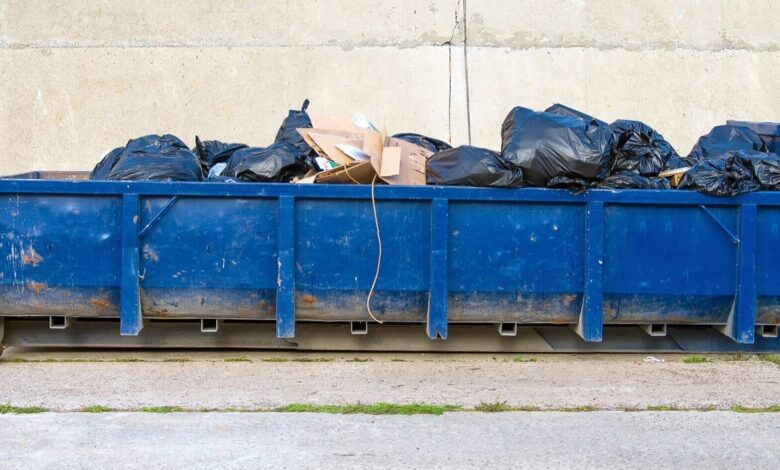What You Can and Cannot Dispose of in a Roll Off Dumpster

Introduction
Renting a roll off dumpster is one of the most convenient ways to manage waste during cleanouts, renovations, and construction projects. However, not everything can be thrown into a dumpster. Understanding what is allowed and what is prohibited is essential to avoid extra fees, environmental hazards, and potential legal issues.
Many renters assume they can dispose of all types of waste in a dumpster, only to be surprised when certain materials are rejected or incur additional charges. Different types of waste require specific disposal methods, and local regulations may vary based on where you rent your dumpster.
This guide outlines the materials that can safely be placed in a dumpster and those that require alternative disposal methods. By following these guidelines, you can ensure a smooth and hassle-free waste removal process.
Acceptable Items for Dumpster Disposal
Most general waste and construction debris can be placed in a roll off dumpster. These materials are commonly accepted:
1. Household Junk
✅ Old furniture (couches, tables, chairs)
✅ Mattresses (some locations may have restrictions)
✅ Rugs and carpets
✅ Clothing, shoes, and textiles
✅ Toys, books, and miscellaneous household clutter
Household junk is among the most common types of waste disposed of in dumpsters. Whether you’re decluttering, moving, or handling an estate cleanout, a roll off dumpster is a great solution.
2. Construction and Demolition Debris
✅ Drywall and plaster
✅ Wood (lumber, plywood, pallets)
✅ Flooring (tile, laminate, hardwood)
✅ Bricks, concrete, and stone (check for weight limits)
✅ Roofing materials (shingles, underlayment, flashing)
Dumpsters are widely used on construction sites for handling renovation and demolition debris. Keep in mind that heavier materials like concrete and bricks may require a dumpster with higher weight capacity.
3. Yard Waste
✅ Grass clippings and leaves
✅ Tree branches and shrubs
✅ Soil and sod (in limited quantities)
✅ Wooden fences and decking
Many roll off dumpsters accept yard waste, but some areas have separate guidelines for green waste recycling. It’s best to confirm with your rental provider if mixed loads are permitted.
4. Non-Hazardous Appliances
✅ Stoves and ovens
✅ Microwaves
✅ Washing machines and dryers
✅ Dishwashers
Appliances that do not contain refrigerants (such as stoves and washers) can usually be disposed of in a dumpster. However, refrigerators and air conditioners require special handling due to freon and other chemicals.
5. Paper and Cardboard
✅ Boxes and packaging materials
✅ Magazines and newspapers
✅ Office paper and shredded documents
Cardboard and paper products can generally be thrown in a dumpster, but large amounts may be better suited for recycling to reduce landfill waste.
Items That Are Not Allowed in a Dumpster
Certain materials are restricted due to safety, environmental, or regulatory reasons. These items require alternative disposal methods:
1. Hazardous Waste
❌ Paint, stains, and solvents
❌ Pesticides and herbicides
❌ Cleaning chemicals and bleach
❌ Asbestos-containing materials
Hazardous waste must be disposed of at specialized collection facilities. Many cities offer hazardous waste disposal programs to help residents safely remove these materials.
2. Electronics and Batteries
❌ TVs, computers, and monitors
❌ Laptops, tablets, and cell phones
❌ Car batteries and lithium-ion batteries
Electronic waste (e-waste) contains toxic components like lead and mercury. Many retailers and local recycling centers offer electronic waste disposal services.
3. Tires and Auto Parts
❌ Car and truck tires
❌ Motor oil and antifreeze
❌ Gasoline and brake fluid
Tires are not allowed in most dumpsters because they can damage landfill liners. Instead, many auto shops and tire retailers accept used tires for recycling.
4. Large Appliances with Refrigerants
❌ Refrigerators and freezers
❌ Air conditioners
❌ Dehumidifiers
These appliances contain freon, a regulated refrigerant that must be removed by a certified technician before disposal. Check with your local waste management provider for proper disposal options.
5. Medical and Biohazard Waste
❌ Syringes and needles
❌ Prescription medications
❌ Contaminated gloves or bandages
Medical waste requires specialized handling and cannot be disposed of in standard dumpsters. Pharmacies and medical facilities often provide safe disposal programs for these materials.
Special Considerations for Weight Limits and Regulations
Even when disposing of approved materials, it’s important to be mindful of weight limits. Roll off dumpsters have weight restrictions, and exceeding them can result in additional charges.
Tips to Stay Within Weight Limits:
✔ Distribute heavy materials (like concrete) evenly across the dumpster.
✔ Avoid overloading with dense materials—use a smaller dumpster for heavy debris.
✔ Check with the rental company about weight restrictions before loading your dumpster.
Additionally, some materials may require separate disposal methods based on local regulations. For example, some municipalities have restrictions on mixing yard waste with household junk. Always check with your rental provider or local authorities to ensure compliance.
What to Do with Restricted Items
If you have materials that cannot go in a dumpster, here are some alternative disposal solutions:
✔ Hazardous waste: Take to a designated hazardous waste collection center.
✔ E-waste: Check if your local electronics store or municipality offers recycling programs.
✔ Tires: Bring them to an auto repair shop or tire recycling facility.
✔ Refrigerators and air conditioners: Contact a professional service to safely remove refrigerants before disposal.
✔ Medical waste: Return medications to a pharmacy with a take-back program.
Proper disposal ensures compliance with environmental regulations and prevents harmful materials from entering landfills.
Choosing the Right Dumpster Rental Provider
When renting a roll off dumpster, it’s essential to work with a provider that follows proper waste disposal guidelines. A company like Delta Waste Solutions ensures that materials are handled in compliance with local and environmental regulations.
Before booking a dumpster, ask:
- What materials are accepted and prohibited?
- Are there weight limits or additional fees?
- Is recycling available for certain waste types?
- What are the guidelines for proper loading and disposal?
Selecting a reputable dumpster rental provider helps prevent unexpected costs and ensures a responsible waste management process.
Final Thoughts
Understanding what can and cannot be disposed of in a roll off dumpster is key to avoiding fines, reducing environmental impact, and keeping your cleanup efficient. Household junk, construction debris, and yard waste are generally accepted, while hazardous materials, e-waste, and refrigerants require special handling.
By following proper disposal guidelines and working with a trusted provider, you can ensure a hassle-free dumpster rental experience. Whether you’re handling a home renovation, decluttering, or a large-scale cleanup, responsible waste management makes the process smoother and more environmentally friendly.




